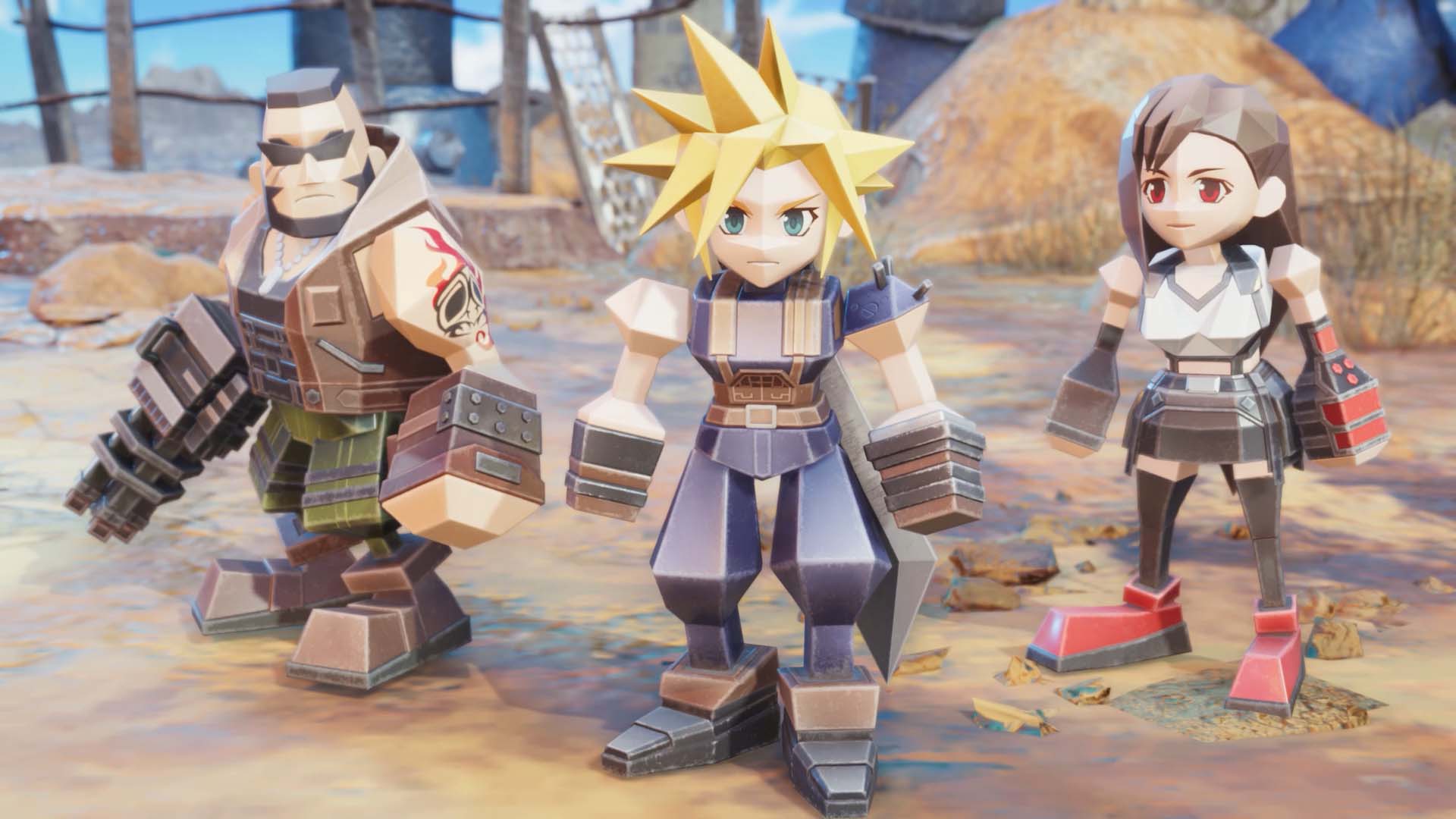A bit over a year ago, on this very website, I proclaimed my love of "silly little mini-games." This is still true: I do love them and, as I stated then, I have wasted hundreds of hours of my life playing these games-within-games. Of particular note was the Final Fantasy series; in my ode to miniature distractions, I singled out Final Fantasy IX and its Chocobo digging game, as well as Blitzball in Final Fantasy X. I felt happy with the way I portrayed a quirk of my gamer experience, especially when it came to my favorite video game series of all time. Then Final Fantasy VII Rebirth ruined everything.
First, some context: Final Fantasy VII Rebirth (I am going to call it Rebirth from now on) is the second in a trilogy that aims not just to modernize the original Final Fantasy 7, one of the most beloved and "important just for existing" games ever, but to re-conceptualize the entire project. The first in this trilogy, Final Fantasy VII Remake, released in April of 2020, teased some interesting deviations from one of video games' most famous stories; I won't bore you with the specifics, but they boil down to "fate is mutable" in both a narrative and meta sense. Remake also expanded the initial section of the original game, which was at most seven or eight hours of exploring the city of Midgar, into a full-blown experience. It was a game of substantive length and depth, and it took me about 80 hours to complete.
It was thrilling to see a section of a game that I knew become something different, weirder, and more engaging. What would Square Enix, the venerated developers behind the Final Fantasy series, do with the larger part of the original game covered in Rebirth?
The answer, it pains me to say, is "way too much." Rebirth wants to be everything under the sun, and it wants to do that a lot, but it ends up trapped in an open-world hell of its own making. I have played 35 hours of Rebirth as I write this, and I am only at the start of chapter nine; there are 14 overall. That is a good pace, if the goal is to get my money's worth in terms of hours played. The quantity of those hours, and the hours yet to come, is not in question here; the issue, and what keeps Rebirth from its potentially towering peaks, is the quality of those hours. Put simply, there is so much bullshit on top of so much other bullshit in this game that it hides and hinders what works best about Rebirth under a pile of directionless extracurriculars.
I must deviate here, briefly, just for a second, to complain about Assassin's Creed. In my mind, no marquee video game franchise has done more harm than Assassin's Creed, thanks to its over-reliance on open world checklist content that's plainly there to pad playtime. In those games, the player can track down towers that then show a myriad of collection activities; it blurs together in a repetitive gameplay loop of "tower, explore, repeat."
This formula, which is now nearly synonymous with Ubisoft, the developers of Assassin's Creed, has been copied many times over in the years since. Sometimes, it should be said, even in great games—The Legend of Zelda: Breath of the Wild eschewed the traditional set-up of that series in order to essentially make Assassin's Creed: Hyrule, but it worked because it was so charming and such a departure. (For me, personally, the sequel to that game, Tears of the Kingdom, didn't quite hit because it followed much the same formula, while adding some entertaining if overly cumbersome Fortnite-esque crafting. I never got close to finishing it.)
Rebirth takes whatever lessons developers have learned since the original Assassin's Creed and throws them out the window, and it doesn't help. The formula here is as basic as it comes for this genre of open-world AAA game. In each of the game's regions—so far, I have hit upon the Grasslands, Junon, and Corel—there are a bunch of towers, and once revealed on the map, a bunch of mindless combat and puzzle activities to complete in order to get a currency that allows the player to buy some great spells. (There are other rewards, both in terms of additional lore on these regions and helpful items, but the main draw is the currency.) The overall effect is mind-numbing; if a player wants to see everything Rebirth has to offer, they must slow the pace of the story down and spend hours running around checking things off a list.
"It's all optional," is generally the defense from those who defend the choice to utilize the Assassin's Creed playbook. And, a couple of exceptions notwithstanding, Rebirth does make it clear that all of the open-world content, all of the tower hunting and puzzle solving, is not strictly required in order to complete the main storyline. Does that make it acceptable that Square Enix has hidden some of the best spells in the game, and some of the most fun combat challenges in the history of the series, under a layer of going here, then going there, then going back in the other direction, while hours of your life slip by? I do not think so, but I can see the counter-arguments.
What is less acceptable to me is Rebirth's obsession with mini-games. There are so many mini-games here, and they all stink. (A walkthrough website lists 23 different mini-games, which is just obscene.) Final Fantasy has always had mini-games, and some of them have been great. Others have not, but the mini-games have never been as much of a focus as they are in Rebirth. Some of the games, like an annoying obstacle course in which the player rides a dolphin, or a race on the aforementioned Chocobos that one must win in order to advance the plot, are required. Others hide some juicy rewards to entice players away from the core gameplay.
Here, by way of example, is one of my least favorite mini-games of all time: Pirate's Rampage. The vacation city of Costa del Sol is a mini-game bonanza in the form of a beach town, including a shooting game not dissimilar from one you might find at a carnival. The player must shoot moving targets on a pirate ship in order to rack up higher and higher scores, which then unlock key spells and accessories. It's horrible. The controls make little sense—why am I aiming with the left joystick, when every shooter known to man uses the right one? Sure, you can flip that, but then it also flips the shooting button from the universal right trigger to the left. Later versions of the game punish the player for missing shots, which would be fine if not for how janky the aiming is at any speed.
Even if Pirate's Rampage, or any of the other mini-games in Rebirth, were perfectly executed—and this bit is subjective, so your mileage may vary—the sheer amount of distractions to the main plot would grate. The Fort Condor mini-game, pictured in the photo atop this story, is probably the best of the bunch. It's a strategic tower defense diversion that uses blocky character models reminiscent of the original FF7, and I didn't hate my life while playing it during the Junon region's exploration slog, which means it stands out from the rest positively. Even then, though, I couldn't help but think that the half hour or so I spent mastering Fort Condor would have been better spent advancing the plot.
The story of Rebirth benefits from urgency. To summarize it briefly, the party is chasing after Sephiroth, the biggest of bads, before he does something irrevocable to the planet and its inhabitants. (There's also some corporate intrigue with Shinra, a power company that is so strong that it function as a nation onto itself.) That's a stock fantasy RPG plot, but it's perfectly paced within the story sections, and the player party faces intriguing obstacles and personal character stories on the way to the conclusion.
It's also fundamentally at odds with the out-of-the-story sections, especially in terms of narrative cohesion. If there is such urgency to catch Sephiroth, why in the world are we stopping for hours on end to chase down some towers? (For those who know the original game, I have also not yet gotten to that death, one of the most famous and revered in gaming, because I've been so bogged down with all of this nonsense.) Open-world games, even great ones, generally all have these problems, but that narrative dissonance can be offset by sufficiently intriguing side quests. Take The Witcher 3, one of the best games of the last decade. The main character, Geralt of Rivia, is on the trail of his would-be daughter Ciri, and there's urgency there, but he also is helping the people of the world in what are in turn heartbreaking and thrilling questlines. The two aspects are not remotely at odds.
Rebirth, on the other hand, slows its world-ending stakes seemingly just to throw more mini-games in the player's face. I can only speak for myself here, but I have lost the momentum to keep playing whenever faced with a new region, new towers, and new mini-games. Just last night, I thought I was about to continue into the bulk of chapter nine when one of the side quests introduced yet another mini-game (Cactuar Crush, for those who have reached that point in the game). It's not required for the main plot, but it is required in order to get 100 percent completion. At least that mini-game uses Rebirth's excellent and kinetic combat as the base gameplay; it's one of the better ones just for that reason, even if it is dull in comparison to the big boss fights of the storyline missions.
This is all a tricky needle to thread, and Square Enix's entire remake project remains incredibly ambitious. By splitting a long, but not endless, game into three parts—partly to expand the beloved original, and partly because selling the same game in three pieces is more financially beneficial—the company had to add and extend the optional content. Still, I would have preferred that Rebirth take the Witcher 3 approach to its open world—give the player interesting things to discover when exploring, by all means, but give them character. More mini-games, and making them required for progression, isn't inherently a negative. But Rebirth would benefit if those detours were fewer in number and greater in quality.
Instead, Rebirth gets in its own way, and makes what works about the game—its plot, its characters, its combat—secondary to forcing the player to learn different, mostly dull ways to play. I would have much preferred if they had cut bits of exploration and at least half of the mini-games to deliver 40 stellar hours of gaming, instead of 100 hours of bloat. Not everything needs to be Assassin's Creed; certainly a Final Fantasy game does not also need to be Mario Party. My hope for the third and final part of this trilogy, covering the climactic segments of the original game, is that Square Enix gets the ratio right, and that Rebirth winds up as a failed experiment rather than an ominous portent of horrible things to come. Right now, 35 hours into the second game, I don't have a lot of hope that the finale will be any better.






